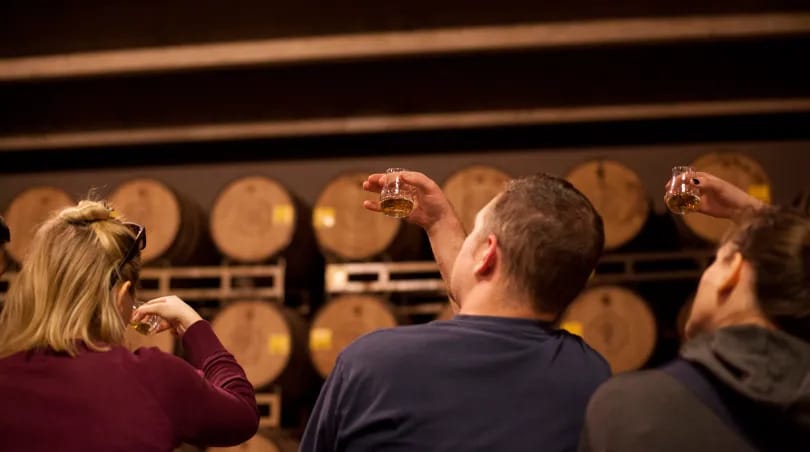
People hold glasses of whiskey up to the light on a tour of Stranahan’s Colorado Whiskey in Denver on Feb. 23, 2017. (Amy Brothers/The Denver Post)
A brewmaster is becoming a distiller.
Scott Kerkmans has worked in beer all his life. He started and ran the beer program at Metropolitan State University of Denver, and previously worked for Alaskan Brewing Co., Kelly’s Brewpub and Nazdar Beer Inc.
But now, he’s switching to whiskey.
“The first half of making whiskey is essentially making beer, so I always had some vague knowledge and desire to explore whiskey a little more,” Kerkmans said.

Scott Kerkmans
Kerkmans officially launched his company, Confluence Whiskey Project, last month, although he said he’s been developing the idea since 2020. He’s working to secure a 10,000-square-foot warehouse in Englewood for production and will eventually add a tasting room.
Kerkmans expects to have equipment in six to 12 months, but said the whiskey won’t hit the market for about three years because it has to age a minimum of two years.
To get to that point, Confluence raised $2 million last month to fund the entire operation. In addition, Kerkmans said he’s seeking a loan through the Small Business Administration.
“We have to raise enough money to cover all of our operating expenses, plus debt service for three years of production before we release any product,” he said.
While the distilling process requires more patience than craft beer, Kerkmans said there’s more upside.
“The (whiskey) market in general, it’s just not as mature of a market as beer,” he said. “In some ways craft spirits are around 10 years younger or behind the craft beer market.”
Kerkmans said there are about 30 distilleries in the Denver metro area, but only 10 or so – such as Laws House Whiskey and Leopold Bros. – are whiskey-focused and medium-sized brands.
Kerkmans said he expects to hit the “sweet spot” of price approachability and quality. To start, the brand will produce bourbon and rye whiskey, likely priced under $70 per bottle.
He said Confluence will be entirely self-sourced and produced, which is not the norm in the whiskey business. He said many brands outsource production, although consumers don’t necessarily know it.
“The vast majority of whiskey and especially craft whiskey in America today is made from one producer in Indiana (MGP),” Kerkmans said. “And people buy that and brand it as their own.”
Kerkmans said if consumers see “produced by” or “bottled by” on whiskey labels, it’s fairly safe to assume it came from a larger distiller such as MGP.
“We’re trying to get people that ability to feel like they’re connected to our brand and the craft spirits industry and whiskey in particular,” Kerkmans said. “We’re not sourcing from anyone else, or taking any steps that would lessen the quality.”

People hold glasses of whiskey up to the light on a tour of Stranahan’s Colorado Whiskey in Denver on Feb. 23, 2017. (Amy Brothers/The Denver Post)
A brewmaster is becoming a distiller.
Scott Kerkmans has worked in beer all his life. He started and ran the beer program at Metropolitan State University of Denver, and previously worked for Alaskan Brewing Co., Kelly’s Brewpub and Nazdar Beer Inc.
But now, he’s switching to whiskey.
“The first half of making whiskey is essentially making beer, so I always had some vague knowledge and desire to explore whiskey a little more,” Kerkmans said.

Scott Kerkmans
Kerkmans officially launched his company, Confluence Whiskey Project, last month, although he said he’s been developing the idea since 2020. He’s working to secure a 10,000-square-foot warehouse in Englewood for production and will eventually add a tasting room.
Kerkmans expects to have equipment in six to 12 months, but said the whiskey won’t hit the market for about three years because it has to age a minimum of two years.
To get to that point, Confluence raised $2 million last month to fund the entire operation. In addition, Kerkmans said he’s seeking a loan through the Small Business Administration.
“We have to raise enough money to cover all of our operating expenses, plus debt service for three years of production before we release any product,” he said.
While the distilling process requires more patience than craft beer, Kerkmans said there’s more upside.
“The (whiskey) market in general, it’s just not as mature of a market as beer,” he said. “In some ways craft spirits are around 10 years younger or behind the craft beer market.”
Kerkmans said there are about 30 distilleries in the Denver metro area, but only 10 or so – such as Laws House Whiskey and Leopold Bros. – are whiskey-focused and medium-sized brands.
Kerkmans said he expects to hit the “sweet spot” of price approachability and quality. To start, the brand will produce bourbon and rye whiskey, likely priced under $70 per bottle.
He said Confluence will be entirely self-sourced and produced, which is not the norm in the whiskey business. He said many brands outsource production, although consumers don’t necessarily know it.
“The vast majority of whiskey and especially craft whiskey in America today is made from one producer in Indiana (MGP),” Kerkmans said. “And people buy that and brand it as their own.”
Kerkmans said if consumers see “produced by” or “bottled by” on whiskey labels, it’s fairly safe to assume it came from a larger distiller such as MGP.
“We’re trying to get people that ability to feel like they’re connected to our brand and the craft spirits industry and whiskey in particular,” Kerkmans said. “We’re not sourcing from anyone else, or taking any steps that would lessen the quality.”
